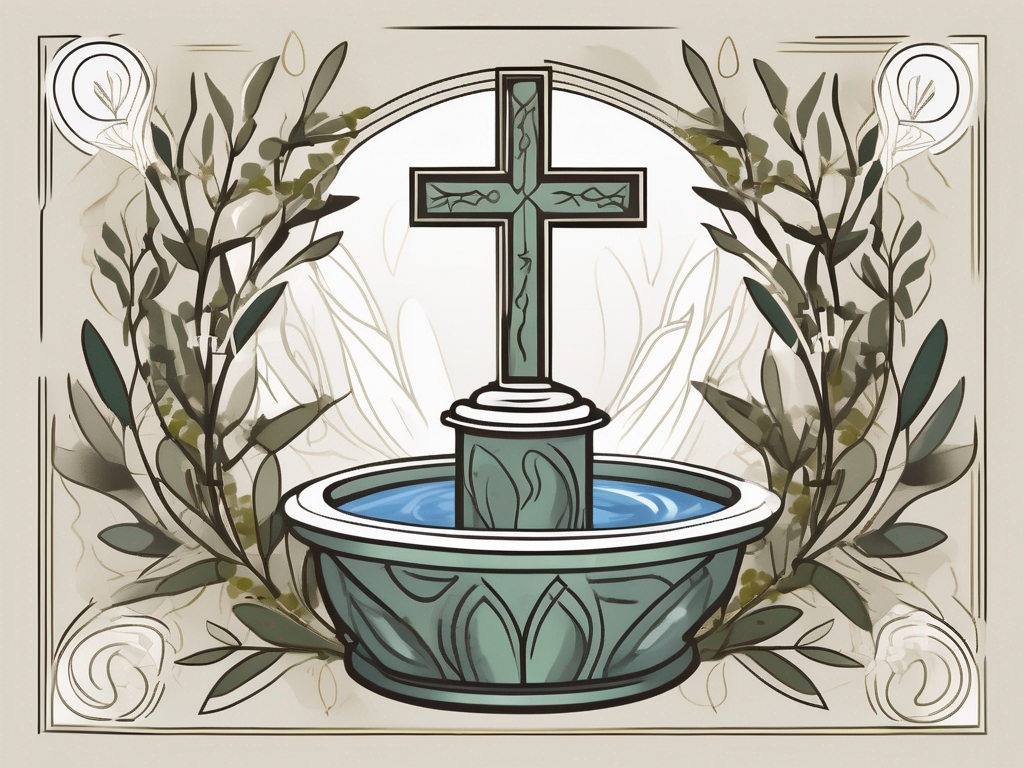Christian baptism holds great significance in the life of a believer, as it symbolizes the initiation into the Christian faith and serves as a profound expression of one’s commitment to Christ. Understanding the concept of baptism requires a closer look at its biblical origins and the symbolism behind this sacred ritual.
Understanding the Concept of Christian Baptism
Baptism, as practiced by Christians today, traces its roots back to the teachings of Jesus Christ and the early Christian church. It represents a powerful symbol of spiritual rebirth and cleansing, as well as an outward sign of an inward transformation.
The Biblical Origin of Baptism
In the Bible, baptism is first mentioned in the account of John the Baptist, who was known for his preaching and baptizing people in the Jordan River. John’s baptism was a call to repentance and a preparation for the coming Messiah.
John’s message resonated with people from all walks of life. Crowds flocked to the riverbanks, eager to confess their sins and be baptized by John. The act of baptism became a significant event, as individuals sought to cleanse themselves and start anew.
Later, Jesus Himself was baptized by John, not because He needed to repent, but to fulfill all righteousness. Jesus’ baptism marked the beginning of His public ministry, and it exemplified His identification with humanity.
As Jesus emerged from the waters of the Jordan River, a voice from heaven declared, “This is my beloved Son, with whom I am well pleased.” This divine affirmation confirmed the significance of baptism and its role in the life of a believer.
The Symbolism Behind the Ritual
Baptism is a symbolic act that represents various aspects of one’s faith journey. It signifies the washing away of sins, the death and resurrection of Jesus, and the believer’s own spiritual renewal.
When a person is immersed in water during baptism, it signifies the death and burial of their old self. Just as Jesus was laid in the tomb, the person being baptized is submerged beneath the water, symbolizing the burial of their past sins and mistakes.
As they rise out of the water, it represents their new life in Christ, symbolizing their participation in His resurrection. This powerful imagery illustrates the transformative power of Jesus’ sacrifice and the believer’s union with Him.
Furthermore, baptism is often seen as a public declaration of faith, an opportunity for believers to publicly proclaim their commitment to follow Jesus and become a part of the Christian community. It is a moment of celebration and joy as the individual takes a significant step in their spiritual journey.
Throughout history, baptism has been a central rite in Christianity, uniting believers across denominations and cultures. It serves as a reminder of God’s grace and love, a tangible representation of His forgiveness and the believer’s acceptance into the family of God.
As Christians, the act of baptism holds deep meaning and significance. It is a sacred moment of surrender, a tangible expression of faith, and a powerful symbol of new life in Christ.
The Theological Significance of Christian Baptism
Christian baptism carries deep theological significance, reflecting its role as a sacrament of initiation and its connection to the believer’s salvation.
But what exactly does this sacrament entail? Let’s delve deeper into the theological aspects of Christian baptism.
Baptism as a Sacrament of Initiation
In many Christian traditions, baptism is considered one of the sacraments of initiation, along with confirmation and the Eucharist. It is through baptism that an individual is officially welcomed into the Church, becoming a member of the body of Christ.
But what does it mean to be initiated into the Church? Baptism symbolizes the believer’s identification with the death, burial, and resurrection of Jesus Christ. Just as Jesus died and rose again, the person being baptized dies to their old self and is raised to new life in Christ.
Through this sacrament, believers receive the indwelling of the Holy Spirit, who empowers them to live a transformed life and equips them for Christian service. The Holy Spirit becomes their guide and companion on their spiritual journey.
The Role of Baptism in Salvation
While baptism is not a requirement for salvation, it is seen as an integral part of the believer’s journey of faith. It is through baptism that individuals publicly profess their faith in Jesus Christ and embrace the gift of salvation offered through His sacrifice.
But what does baptism have to do with salvation? Baptism is often viewed as a means of receiving God’s grace and forgiveness, as it symbolizes the cleansing of sin and the believer’s participation in Christ’s redemptive work.
When a person is baptized, they are immersed in water, symbolizing the washing away of their sins and the beginning of a new life in Christ. This act of immersion represents the believer’s identification with Jesus’ death and burial. As they rise out of the water, it symbolizes their participation in Jesus’ resurrection and the hope of eternal life.
Furthermore, baptism is a public declaration of faith. It is a visible sign to the world that the believer has chosen to follow Jesus and has been transformed by His saving grace. It is a testimony to the believer’s commitment to live a life that reflects the teachings and example of Christ.
So, while baptism does not save a person, it is a powerful symbol of salvation and an important step in the believer’s spiritual journey.
The Rites and Rituals of Christian Baptism
The process of Christian baptism is a sacred occasion that holds great significance in the life of a believer. It is a symbolic act that represents the individual’s commitment to their faith and their desire to be cleansed of sin. The role of godparents in this ceremony is also of utmost importance, as they play a vital role in the spiritual upbringing of the baptized person.
The Process of Baptism
The process of baptism can vary among different Christian denominations, each with their own unique traditions and practices. However, at its core, baptism involves the application of water or the immersion of the person being baptized. This act is accompanied by specific prayers, blessings, and the profession of faith.
For some denominations, baptism is performed on infants, symbolizing the cleansing of original sin and the child’s initiation into the Christian community. In these cases, the parents and godparents make promises on behalf of the child, vowing to raise them in the teachings of the faith.
On the other hand, adult baptism is practiced by certain denominations, where individuals make a conscious decision to be baptized after a period of instruction and preparation. This process often involves studying the scriptures, attending classes, and seeking guidance from spiritual mentors.
The Importance of Godparents in Baptism
In many Christian traditions, godparents hold a significant role in the baptism ceremony. They are chosen by the parents or the individual being baptized and serve as spiritual guides and mentors throughout their life.
Godparents take on the responsibility of nurturing the child’s faith and supporting their journey of discipleship. They are there to provide guidance, wisdom, and encouragement, helping the baptized person navigate the challenges and joys of their spiritual life.
Furthermore, godparents often represent the broader Christian community. They stand as witnesses to the baptism, affirming their commitment to the spiritual growth of the baptized person. They offer their ongoing support, love, and prayers, ensuring that the individual never feels alone in their faith journey.
Godparents also have the privilege of being a role model, demonstrating what it means to live a life of faith and virtue. They are called to exemplify the teachings of Christ, showing the baptized person what it means to love God and others.
Moreover, godparents often participate in the sacraments and religious milestones of the baptized person’s life. They may be present at their first communion, confirmation, and even their wedding, continuing to guide and support them as they grow in their faith.
In conclusion, the process of Christian baptism and the role of godparents are deeply intertwined. Baptism represents the beginning of a lifelong journey of faith, and godparents are there to provide guidance, support, and love every step of the way. Through this sacred ceremony, individuals are welcomed into the Christian community, surrounded by the prayers and blessings of their loved ones.
Different Denominational Views on Baptism
While the concept of baptism is shared across Christian denominations, there are varying perspectives on its specific meaning and practice.
Baptism, a significant sacrament in Christianity, holds different interpretations among various denominations. It is a sacred ritual that symbolizes purification, initiation, and the reception of God’s grace. Let’s explore some of the different perspectives on baptism within the Catholic and Protestant traditions.
Catholic Perspective on Baptism
In the Catholic Church, baptism is seen as an essential sacrament of initiation, necessary for the forgiveness of original sin and the reception of God’s grace. It is typically performed in infancy and is followed by the sacraments of confirmation and Eucharist.
According to Catholic teaching, baptism is a transformative event that cleanses the soul, making it a vessel for God’s love and grace. Through the sacrament, the individual becomes a member of the Church, entering into a lifelong journey of faith and spiritual growth.
The Catholic Church places great importance on the role of godparents in the baptismal ceremony. Godparents, chosen by the parents, are responsible for guiding the baptized individual in their spiritual journey and ensuring their adherence to the teachings of the Church.
Protestant Views on Baptism
Protestant denominations have diverse views on baptism, often reflecting an emphasis on personal faith and individual interpretation of Scripture. While some practice infant baptism, others reserve it for believers who can make a conscious profession of faith.
For many Protestants, baptism is seen as an act of obedience and a public declaration of faith, symbolizing the believer’s identification with Jesus’ death and resurrection. It is viewed as a powerful symbol of spiritual rebirth and a commitment to follow Christ.
Among Protestant denominations, there are variations in the mode of baptism. Some practice immersion, where the individual is fully submerged in water, symbolizing the burial and resurrection of Jesus. Others practice sprinkling or pouring of water, emphasizing the cleansing and renewing power of baptism.
Furthermore, baptism is often seen as a significant milestone in one’s faith journey, marking the beginning of a personal relationship with God and the incorporation into the community of believers.
It is important to note that while there are differences in the understanding and practice of baptism among Christian denominations, the central theme of spiritual transformation and the expression of faith remains constant.
Overall, the diverse perspectives on baptism within Christianity reflect the richness and complexity of the faith tradition, highlighting the importance of personal conviction and communal worship in the Christian experience.
The Impact of Baptism on Christian Life
Baptism is not merely a one-time event but a transformative experience that shapes the believer’s journey of faith and their commitment to living out the teachings of Christ.
When an individual undergoes baptism, they are immersed in water, symbolizing their identification with the death and resurrection of Jesus Christ. This act of immersion signifies the believer’s desire to die to their old self and be raised to new life in Christ. It is a powerful symbol of spiritual rebirth, representing the believer’s purification from sin and their entrance into a new life of faith.
Baptism as a Commitment to Faith
Through baptism, individuals enter into a covenant relationship with God, committing themselves to follow Jesus and seek His guidance throughout their lives. It serves as a reminder of the believer’s commitment to pursue holiness and reflect the love and grace they have received.
Moreover, baptism is not a mere ritual or tradition but a deeply personal and intentional act of faith. It signifies the believer’s decision to publicly declare their allegiance to Christ and their willingness to live according to His teachings. This commitment to faith is not a one-time event but an ongoing journey of growth and transformation.
The Role of Baptism in Christian Community
Baptism is not a solitary act but a communal experience that connects believers to the wider Christian community. It signifies their inclusion in the body of Christ and highlights the importance of mutual support, accountability, and unity among fellow believers.
When an individual is baptized, they become part of a larger family of believers who share a common faith and purpose. This sense of belonging fosters a deep sense of community and encourages believers to support and encourage one another in their spiritual journey.
Additionally, baptism opens the door to the sacramental life of the Church, providing opportunities for ongoing growth, worship, and service within the context of the Christian community. It is through baptism that believers are able to participate in the Eucharist, receive the sacrament of reconciliation, and engage in various forms of ministry and service.
Furthermore, baptism serves as a visible sign of unity among believers from different backgrounds and traditions. Regardless of denominational differences, baptism is a unifying practice that brings together Christians from various walks of life, emphasizing the essential unity of the body of Christ.
In conclusion, Christian baptism holds immense significance in the life of a believer. It is a powerful symbol of spiritual rebirth, a public declaration of faith, and a sacrament of initiation into the body of Christ. As believers seek to understand the origins, symbolism, and theological significance of baptism, it becomes a transformative experience that shapes their journey of faith and fosters a deep sense of belonging in the Christian community.












